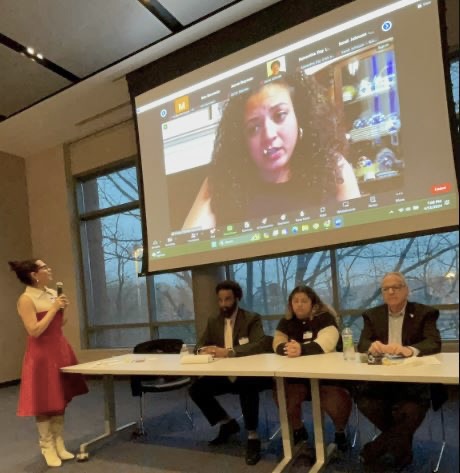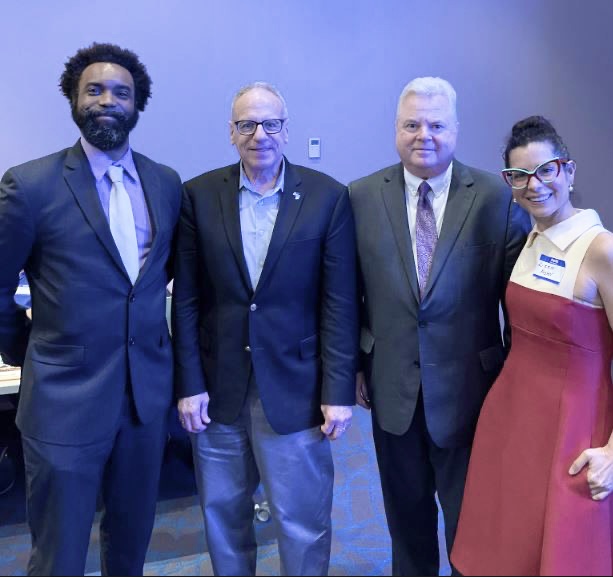
Photo by Helena Lopes on Unsplash
Lawmakers and activists gathered together with students and other groups at Manhattan College on April 11 for a town hall to discuss longstanding pending legislation aimed at protecting rape victims who may have been voluntarily intoxicated at the time of the rape. The law aims to close a legal loophole in State law that currently helps protect those accused of rape from prosecution in situations where the victim is voluntarily intoxicated.
In contrast to the existing law, which does allow the pursuit of a legal action against a sexual assault predator in cases where the sexual assault victim was incapacitated due to involuntary consumption of drugs or alcohol e.g. when a victim’s drink is spiked, the latest iteration of the proposed additional legislation would also strengthen the case for legal action to be taken against a sexual assault perpetrator in cases where the sexual assault victim is incapacitated due to voluntary consumption of drugs or alcohol.
The proposed legislation A01065 / S04555-B is currently awaiting passage in the New York State legislature, and is sponsored in the Assembly by Assemblyman Jeffrey Dinowitz (A.D. 81) and in the State Senate by State Sen. Nathalia Fernandez (S.D. 34). At the Manhattan College event, the assemblyman said, “Whether you are voluntarily intoxicated or involuntarily intoxicated, to me, I don’t see the difference. Being drunk, being wasted, being high, is not an invitation to be sexually assaulted, period.”
He continued, “If you’re intoxicated, then you’re not in a position to give consent and we have to change the law to address that situation.” The town hall at Manhattan College was organized to educate the public on the legislation. Panelists referenced how the legal loophole dates back to the 1990s which saw a rise in the use of date rape drugs.
Of that era, Dinowitz said, “The issue then is that there were people being drugged involuntarily. Unknown to them, they were being drugged, and therefore they were becoming intoxicated and laws were passed at that time to address those issues.”
As previously reported, the so-called, voluntary intoxication loophole bill had previously been championed by progressive Democrat, former State Sen. Alessandra Biaggi, who represented Bronx Senate District 34. According to the records of the legislature, then senate bill S6679C, sponsored by Biaggi, passed in the senate in July 2020, but not in the assembly, a point on which, as reported, Dinowitz had been taken to task during a later debate with then-candidate, Jessica Altagracia Woolford, who ran unsuccessfully in the 2022 Democratic Primary to unseat the assemblyman, who represents much of the northwest Bronx.

Photo courtesy of Assemblyman Jeffrey Dinowitz
Dinowitz was chair of the codes committee at that time and was asked why the law had not passed during the prevailing legislative session. “It didn’t pass the House or the Senate. Let’s be clear; that’s not good enough,” Dinowitz said at the time, though he did not specify the legislative session to which he was referring. [As above, one iteration of the bill passed in the State Senate in 2020.] “I’ve worked on the bill for a few years now,” the assemblyman said at the time of the debate, adding that not all bills pass as quickly as legislators would like, and that voting coalitions were needed in both legislative houses.
The assemblyman went on to say at that time that he had met with advocates and district attorneys to talk about the issue, adding that the rape cases in question were “horrible” and “unfortunately, don’t often get prosecuted.” He added, “That’s on the DAs’ offices, but I don’t want them to even have the excuse not to prosecute.”
He continued, saying that although he understood some DAs may wish to maintain the best possible win/loss [prosecution] records, he wanted to ensure [rape] victims got justice. Statistics show that securing a rape conviction is notoriously difficult due to a number of factors, not least of which can be the victim’s hesitancy to testify.
Other factors relate to there possibly being no witnesses to the crime, as well as the difficulty for victims in clearly recollecting the rape itself due to the post-traumatic stress it can induce and the brain’s will to suppress the memory of the event in order to cope, as in the case of Dr. Christine Blasey-Ford, who came forward during the confirmation hearings for now-U.S. Supreme Court Justice Brett Kavanaugh in 2018, and testified in Congress that he allegedly raped her when they were both younger. Kavanaugh denied the allegations. He was subsequently confirmed by his peers.
Back in The Bronx, explaining his concern about the subject matter back in 2022, Dinowitz said at the time that he had worked to pass New York’s first anti-trafficking act, which he said had served as a model for the rest of the country. He also said he had sponsored the Child Victims’ Act, which extended the time previously afforded to child victims of sexual abuse to take a case against their abusers, the Adult Survivor’s Act, which served a similar purpose, and the Rape is Rape bill.
The assemblyman acknowledged, nonetheless, at that time that more legislative work was needed and added that he hoped, in future years, both houses of the legislature could come together to pass a bill on voluntarily intoxication exclusion that would be the same in both houses.

Photo courtesy of Assemblyman Jeffrey Dinowitz
Part of the hope of advocates of the latest bill is that it will help focus the criminal justice system on the defendant’s actions, and eliminate victim blaming. “The more we spread the word on this legislation, the better the chances of passing it is,” said Dinowitz. “This is all about getting justice for victims of sexual assault.”
In attendance at the Town Hall were students, student organizations, advocacy groups, and local Democratic party clubs. Madeline Ritter from the Ruth Mullen Riverdale Huddle, a sponsoring organization of the event, said, “We’re pleased to have brought together these local groups and elected officials to help enact legislation that will offer legal protections for survivors of sexual assault who were voluntarily intoxicated.”
Meanwhile, Elizabeth Da Trindade-Asher, from the Cura Collective, an advocacy organization focused on this issue and other women-led initiatives, said, “Eliminating the voluntary intoxication exclusion would end the mindset that our law enforcement has long been trained to focus on: a query of the crime that begins with an examination of the survivor’s conduct instead of the assailant’s.”
The latest bill currently has over 53 assembly co-sponsors which include both Democrats and Republicans, and has advanced to a third reading in the Senate. However, it remains in the codes committee at the assembly level. If the bill is approved by both the Senate and Assembly, it will be sent to New York Gov. Kathy Hochul for review.
“I’m working hard to get it out of committee in the assembly and I’m hoping we can pass it,” said Dinowitz.
As previously reported, a majority of women when under the influence of alcohol are more likely to be raped, according to data made available since 2004, when a study published by the National College of Medicine found that roughly one in 20 women surveyed reported being raped, and nearly three quarters of the victims were raped while intoxicated.
Despite this, almost twenty years later, New York State law still stigmatizes victims of sexual crimes, protecting only those victims who become mentally incapacitated through intoxication at the hands of a third party e.g. through a date-rape drug.
*Síle Moloney contributed to this story.




